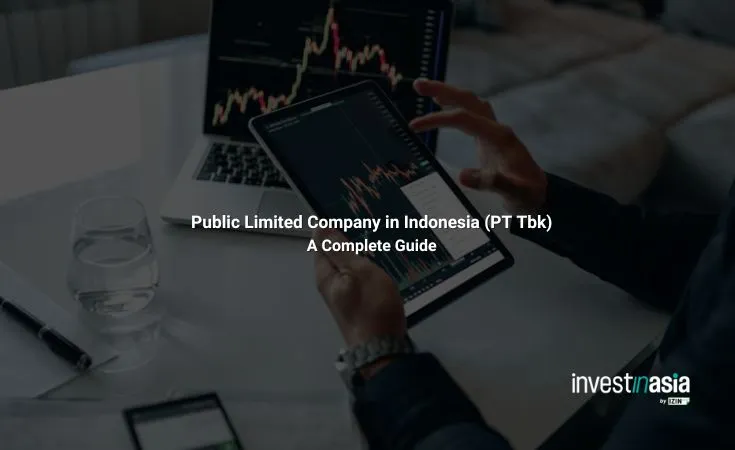A Public Limited Company in Indonesia, known as Perseroan Terbuka (PT Tbk), is a limited liability company whose shares are publicly traded on the Indonesia Stock Exchange (IDX). This structure allows companies to raise capital from the public, gain credibility, and expand faster, making it ideal for large-scale growth and foreign investment.
As part of our consulting team at InvestinAsia, we help investors like you understand how a PT Tbk operates, its legal framework, and what distinguishes it from private limited companies.
What Is PT Tbk in Indonesia?


A PT Tbk is formed when a private limited company (PT) decides to go public through an Initial Public Offering (IPO). After the IPO, “Tbk” is added to the company name, symbolizing its “open” status.
This public structure enhances transparency and investor confidence but also subjects companies to stricter reporting and corporate governance requirements under the Financial Services Authority (OJK) and IDX regulations.
Also read: The Types of Companies and Business Entities in Indonesia
Key Legal Framework
The legal basis for establishing and managing a PT Tbk includes:
- Company Law No. 40 of 2007: Governs all limited liability companies.
- Capital Market Law No. 8 of 1995: Sets disclosure and transparency rules for public companies.
- OJK Regulations: Mandate governance, board structure, and shareholder protection.
- IDX Listing Rules: Specify eligibility, capital, and listing requirements.
These frameworks ensure that PT Tbk entities operate under high corporate governance standards while protecting both investors and shareholders.
Also read: Understanding Indonesia Business Law: A Comprehensive Guide
Ownership and Structure
There are two main classifications of public limited companies:
- Local Public Company (PT Tbk): Fully owned by Indonesian shareholders.
- Foreign Public Company (PT PMA Tbk): Allows foreign ownership, following the Positive Investment List.
Each PT Tbk must have at least:
- 2 Directors
- 2 Commissioners (with at least 30% being independent)
- 300 Shareholders minimum
- Authorized capital of at least IDR 3 billion
This structure ensures accountability and promotes transparent management.
Also read: IPO Guide for PT PMA (Foreign-Owned Companies) in Indonesia
Capital and Listing Requirements
The capital threshold varies depending on which IDX board the company intends to list on:
- Main Board: ≥ IDR 250 billion in net tangible assets
- Development Board: ≥ IDR 50 billion
- New Economy Board: designed for tech-driven companies with flexible capital rules
Companies must also maintain a free float of 10–20% of shares to remain publicly traded.
Also read: Complete Guide to IPO Process in Indonesia for Local and Foreign Companies
Advantages of Establishing a PT Tbk


Operating as a public limited company offers strategic benefits for investors and founders:
- Access to Capital Markets: Raise funds through public share issuance.
- Enhanced Credibility: Listing on IDX increases brand reputation.
- Liquidity for Shareholders: Shares can be freely traded.
- Corporate Governance Standards: Builds investor trust and long-term sustainability.
These advantages make PT Tbk an attractive option for established local companies and growing foreign enterprises seeking regional expansion.
Also read: Complete Guide to Divestment of Foreign Company Shares in Indonesia
Challenges and Compliance Considerations
Despite its benefits, running a PT Tbk also requires careful preparation. You must maintain audited financial reports, ensure continuous public disclosure, and comply with OJK and IDX regulations. Non-compliance can result in penalties or suspension from trading.
Foreign investors should also understand the sectoral restrictions under the Positive Investment List, which determines the allowable ownership percentage in specific industries.
For Foreign Investors: Pathway to Going Public
If you are a foreign entrepreneur or investor looking to establish a business in Indonesia, you can start with a Foreign-Owned Company (PT PMA). Once your business meets performance and financial requirements, it can be converted into a Public Limited Company (PT PMA Tbk) for capital expansion.
At InvestinAsia, we often recommend this staged approach:
- Start with PT PMA registration → build your local foundation
- Develop financial track record → prepare for IPO readiness
- Transform into PT Tbk → access Indonesia’s capital market for long-term growth
How We Can Help
InvestinAsia provide end-to-end assistance for company registration business setup in Indonesia, including:
- PT PMA Registration Service: For foreign investors seeking 100% ownership or joint ventures.
- PT PMDN Registration Service: For local businesses preparing for public expansion.
Our legal and corporate advisory team ensures your company meets every regulatory, governance, and capital requirement to establish or expand in Indonesia confidently.
Contact us today for a FREE consultation and start your expansion journey.
Establishing a Public Limited Company in Indonesia is a strategic move that can unlock funding opportunities, enhance brand reputation, and attract global investors. Whether you’re a local business scaling up or a foreign investor entering the market, understanding the PT Tbk framework is key to long-term success.
At InvestinAsia, we guide you through every stage—from initial setup to IPO readiness—ensuring your company thrives in Indonesia’s dynamic market.
Learn more about our Indonesia Company Registration Services and how we can help you expand confidently.
FAQs About Public Limited Companies in Indonesia
What is the difference between a PT and PT Tbk?
A PT (private company) is owned by limited shareholders, while a PT Tbk offers shares to the public through the IDX.
Can foreign investors own a PT Tbk?
Yes, through a PT PMA Tbk, as long as the business sector is open to foreign ownership under the Positive Investment List.
What are the capital requirements for a PT Tbk?
The minimum authorized capital is IDR 3 billion, but actual requirements depend on the listing board and industry sector.
How long does it take to go public in Indonesia?
Typically, the process from private PT to PT Tbk takes around 12–24 months, depending on company readiness.
What are the governance requirements?
Public companies must have a board of directors, commissioners, an audit committee, internal audit unit, and company secretary to ensure compliance.



